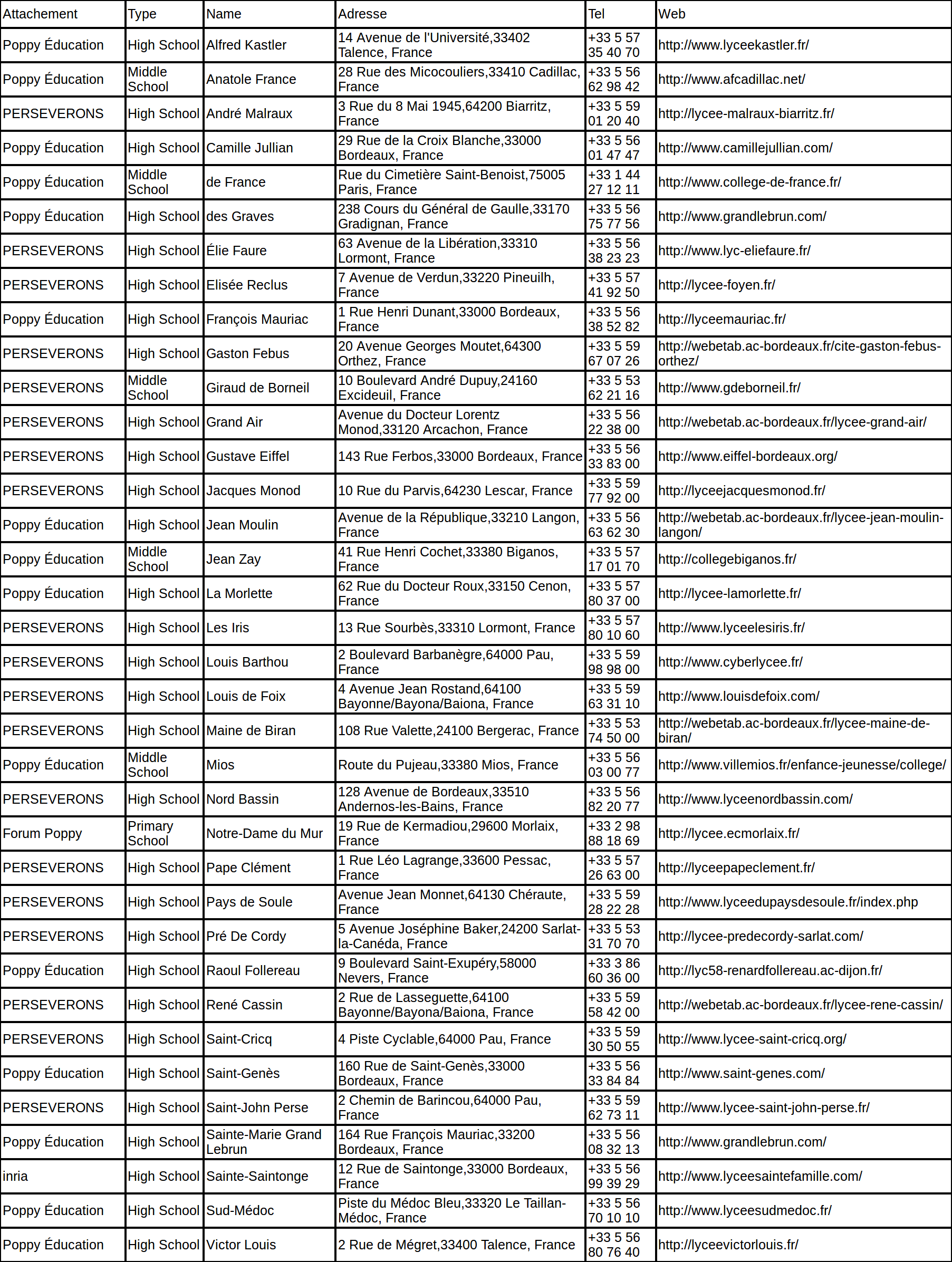Section: Partnerships and Cooperations
Regional Initiatives
Poppy Education
Poppy Education aims to create, evaluate and disseminate pedagogical kits “turnkey solutions” complete, open-source and low cost, for teaching computer science and robotics. It is designed to help young people to take ownership with concepts and technologies of the digital world, and provide the tools they need to allow them to become actors of this world, with a considerable socio-economic potential. It is carried out in collaboration with teachers and several official french structures (French National Education/Rectorat, Highschools, engineering schools, ... ). It targets secondary education and higher education, scientific literacy centers, Fablabs.
Poppy robotic platform used in the project is free hardware and software, printed in 3D, and is intended primarily for:
Educational sectors covered by the project are mainly: Enseignement d’exploration ICN en seconde, enseignement ISN en terminale S et bientôt en 1ère , filière STI2D, MPS seconde. Web: http://www.poppy-project.org/education .
Perseverons Project
The Perseverons project (Perseverance with / by digital objects), carried by the university via the ESPE (Higher School of Teaching and Education) of Aquitaine, and by the Rectorate of Bordeaux via the DANE (Academic Delegation digital education), aims to measure the real effectiveness of digital techniques in education to improve school motivation and perseverance, and, in the long term, reduce dropout. The project proposes to analyze the real effects of the use of two types of objects, robots, tablets, by comparing the school and non-school contexts of the fablabs. He is one of the 22 winners http://www.gouvernement.fr/efran-les-22-laureats of the "E-Fran" call for projects (training, research and digital animation spaces), following the Monteil mission on digital education, as part of the Investissement d'Avenir 2 program http://ecolenumerique.education.gouv.fr/2016/09/23/1244/. Formed of 12 sub-projects, "perseverons" has many partnerships, especially with the Poppy Education project http://perseverons.espe-aquitaine.fr/sp6-robotique-inria/.
Partner schools
In 2017, we have 36 partner schools (show Fig 25). 15 directly from the Poppy Education project. 19 new establishments were equipped in September 2017 by the Perseverons project. 21 of these establishments are located in Gironde. We have 27 high schools, 5 middle school.
ENSAM
The orientation of a (high school) student, choosing a career, is often based on an imagined representation of a discipline, sector of activity or training. Moreover, higher education is sometimes for a college student or a student a self centered universe, with inaccessible teaching methodologies and level of competence.
The Arts and Métiers campus at Bordeaux-Talence in partnership with Inria contributes with its educational and scientific expertise to the development of new teaching methods and tools. The objective is to develop teaching sequences based on a project approach relying on an attractive multidisciplinary technological system: the humanoid Inria Poppy robot. These teaching sequences will be built and tailored to different levels of training, from high schools to Engineer schools.
The new formation "Bachelor of Technology", started in September 2014 at Ensam Bordeaux, is resolutely turned towards a project based pedagogy, outlining concepts from concrete situations. The humanoid Inria Poppy robot offers an open platform capable of providing an unifying thread for the different subjects covered during the 3-years of the Bachelor formation: mechanics, manufacturing (3D printing), electrical, mecha-tronics, computer sciences, design…
For the 1st and 2nd year of the ENSAM Engineer cursus, the Poppy robot is now used to support the teaching and to conduct further investigation.
KidLearn and Region Aquitaine
A Conseil Régional d’Aquitaine Project (KidLearn, 2015-) began, coordinated by Manuel Lopes entitled KidLearn. Will fund of a 3 years PhD student.
We propose here a research project that aims at elaborating algorithms and software systems to help humans learn efficiently, at school, at home or at work, by adapting and personalizing sequences of learning activities to the particularities of each individual student. This project leverages recent innovative algorithmic models of human learning (curiosity in particular, developed as a result of ERC European project of the Flowers team), and combines it with state-of-the-art optimization algorithms and an original integration with existing expert knowledge (human teachers). Given a knowledge domain and a set of possible learning activities, it will be able to propose the right activity at the right time to maximize learning progress. It can be applied to many learning situations and potential users: children learning basic knowledge in schools and with the support of their teachers, older kids using educational software at home, of adults needing to acquire new skills through professional training (“formation professionnelle”). Because it combines innovations in computational sciences (machine learning and optimization) with theories of human cognition (theories of human learning and of education), this project is also implementing a strong cross-fertilization between technology and human sciences (SHS).
Comacina Capsule Creative Art/Science project and Idex/Univ. Bordeaux
The artist community is a rich source of inspiration and can provide new perspectives to scientific and technological questions. This complementarity is a great opportunity that we want to enforce in the Poppy project by making the robot accessible to non-robotic-expert users. The Comacina project, in collaboration with the Flowers team and supported by funding from Idex/Univ. Bordeaux, explored the role of movements and light in expressing emotions: http://comacina.org . This project was implemented through several residencies during the year, and several performances at various cultural places in Aquitaine, including at Pole Evasion in Ambares-et-Lagrave. a report is available at https://flowers.inria.fr/RencontreAutourDuGeste.pdf . It benefitted from funding from the Art/Science Idex call for project.



